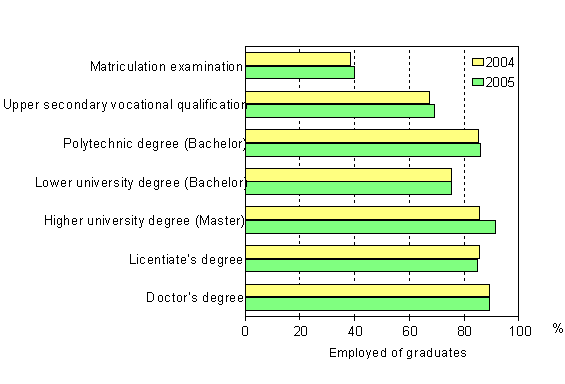Published: 15 May 2007
Employment of recent graduates increased
The transition to working life was smoothest for new graduates with tertiary degrees. Well over 80 per cent of them were employed at the end of 2005. Of the graduates with an upper secondary vocational qualification 69 per cent were employed. Employment increased by roughly one percentage point in nearly all levels of education from the year before.
Graduates with upper secondary vocational qualifications had the highest proportion of unemployment, i.e. 13 per cent, one year after graduation. Six per cent of the graduates from polytechnics and 5 per cent of the graduates with higher university degrees were unemployed. The proportion of the unemployed was smaller than in the past few years.
Transition to working life differed according to field and level of education as well as area. In all fields of education and in the whole country, the transition to working life was smoother for graduates with tertiary degrees than for graduates with upper secondary vocational qualifications. Of all fields of education, the transition to working life was the smoothest for completers of a qualification in the field of safety and security. Well over 80 per cent of graduates from the fields of humanities and education as well as welfare, health and sport were also employed.
Employment of graduates one year after graduation by level of education 2004 and 2005, %

Source: Education Statistics, Statistics Finland.
Inquiries: Ms Ritva Kaukonen +358 9 1734 3311, koulutus.tilastot@stat.fi
Director in charge: Mr Jari Tarkoma
- Tables
-
Tables in databases
Pick the data you need into tables, view the data as graphs, or download the data for your use.
Last updated 15.5.2007
Official Statistics of Finland (OSF):
Transition from school to further education and work [e-publication].
ISSN=1798-9469. 2005. Helsinki: Statistics Finland [referred: 19.4.2025].
Access method: http://stat.fi/til/sijk/2005/sijk_2005_2007-05-15_tie_001_en.html

